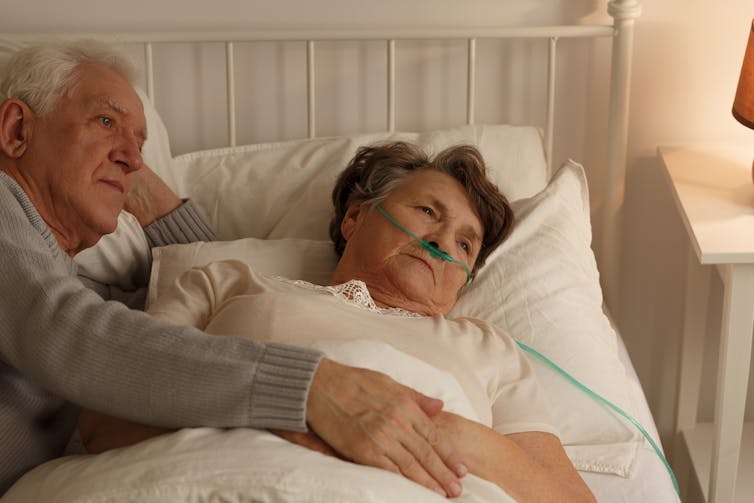Private health insurers should start paying for hospital-type care at home
- Written by Stephen Duckett, Director, Health Program, Grattan Institute
In the past, when you needed chemotherapy or intravenous (in-the-vein) treatments such as antibiotics or hydration, you needed to be admitted to hospital.
These days, it’s possible to have such treatments in the comfort of your home, with nursing or other clinical supports.
Public hospital-in-the-home and other hospital-substitute programs are burgeoning in the public sector, including in Victoria, Western Australia and New South Wales. These programs now provide the equivalent of hundreds of hospital beds.
Read more: From triage to discharge: a user's guide to navigating hospitals
Having treatment at home is more convenient for patients, reduces the demand on hospitals, and cuts costs for the health system.
But if you have private health insurance and want to access these services via a private hospital, it’s often not possible. This needs to change.
What’s the problem?
Private health insurers are tightly regulated. If you have a top “gold” package, for example, the insurer must pay for all hospital services that attract a government Medicare Benefits Schedule (MBS) payment, other than cosmetic surgery.
But insurers are currently not allowed to cover care provided outside of hospitals, except in very limited circumstances.
Insurers are allowed to cover eligible home-based programs developed by private hospitals. But they get to decide on a case-by-case basis whether to cover these programs. And each insurer makes a separate decision for each program.
This means private hospitals must negotiate with each private health insurer for each separate program, for each contract period. This makes it almost impossible for private hospitals to develop sustainable business cases for their programs.
The upshot is patients often miss out on the convenience of having hospital-type services in their home, and instead may face prolonged hospital stays.
The red tape needs to be untangled to make it easier for private hospitals and doctors to run these programs and for insurers to pay for them.
What kind of care can you get at home?
Few hospital-type services are delivered at home under the current system for privately insured patients: they account for about 4% of hospital treatments paid in 2018-19.
Common hospital-type treatments in the home include IV therapy and wound care.
A number of insurers are conducting pilot programs for out-of-hospital rehabilitation after strokes, joint replacements or an accident; chemotherapy; kidney dialysis; and palliative care, so people can die more comfortably in their own homes.
 Pilot programs are underway to allow more people to die in their own homes.
Photographee.eu/Shutterstock
Pilot programs are underway to allow more people to die in their own homes.
Photographee.eu/Shutterstock
Untangling red tape would also allow private hospitals to offer more “prehabilitation” programs to prepare people for elective surgery, and to offer rehabilitation programs in people’s homes after surgery.
Theoretically, hospital-substitute programs at home could expand to other treatment areas such as obstetrics to have your baby at home. Or for mental health treatment, which may be more efficiently provided outside hospital.
But legislative restrictions (designed to stop insurers covering general practice) have limited the expansion of these programs.
Read more: Waiting for better care: why Australia’s hospitals and health care are failing
How should the system work?
Regulation should support people’s access to the most efficient form of care. And private hospitals should have more certainty about how they’ll be reimbursed when they invest in alternatives to hospital inpatient care.
Rather than each insurer deciding whether they should fund good programs, the independent body which assesses and approves the public-sector equivalent of home-based care – the Independent Hospital Pricing Authority – should do the same for the private sector.
If a program has been approved by the authority, then private health insurers should be required to pay for it.
Specialist doctors, such as oncologists, should also be able to establish hospital substitute programs and have them approved for funding by private health insurers.
All of this is about improving quality and access to care, while at the same time reducing costs. It should be easier for private health insurers to pay for better alternatives to hospital care, where they can deliver the same treatment with the same or better outcomes, but at a lower cost.
It is also about providing good alternatives to private hospital care, increasing competition in the health system, and reducing the number of unnecessary hospital admissions.
There are big opportunities for system-wide efficiencies in the private sector by shifting care from inpatient to outpatient settings – particularly for rehabilitation, psychiatric care, eye injections for retinal conditions, and outpatient vein surgery.
The public sector has already expanded its alternatives to hospital inpatient care. It’s time for the private system to do the same.
Read more: Do you really need private health insurance? Here's what you need to know before deciding
Authors: Stephen Duckett, Director, Health Program, Grattan Institute


















